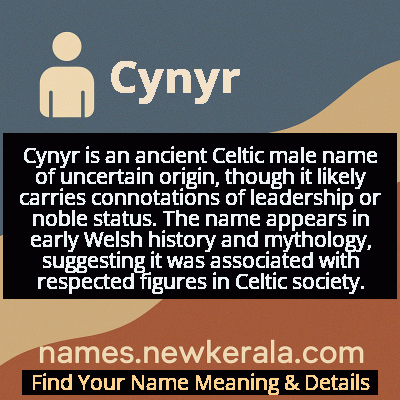Cynyr Name Meaning & Details
Origin, Popularity, Numerology Analysis & Name Meaning of Cynyr
Discover the origin, meaning, and cultural significance of the name CYNYR. Delve into its historical roots and explore the lasting impact it has had on communities and traditions.
Name
Cynyr
Gender
Male
Origin
Celtic
Lucky Number
4
Meaning of the Name - Cynyr
Cynyr is an ancient Celtic male name of uncertain origin, though it likely carries connotations of leadership or noble status. The name appears in early Welsh history and mythology, suggesting it was associated with respected figures in Celtic society.
Cynyr - Complete Numerology Analysis
Your Numerology Number
Based on Pythagorean Numerology System
Ruling Planet
Uranus (Rahu)
Positive Nature
Strong sense of order, loyal, practical, and disciplined.
Negative Traits
Stubborn, overly serious, rigid, and prone to feeling restricted.
Lucky Colours
Blue, gray.
Lucky Days
Saturday.
Lucky Stones
Blue sapphire.
Harmony Numbers
1, 7, 8.
Best Suited Professions
Managers, engineers, accountants, organizers.
What People Like About You
Dependability, discipline, practicality.
Famous People Named Cynyr
Cynyr Ceinfarfog
Legendary Welsh chieftain
Father of Saint Non and grandfather of Saint David in Welsh tradition
Cynyr ap Cawn
Welsh nobleman
Appears in Welsh genealogies as an ancestor of royal lines
Cynyr of Dyfed
Regional ruler
Mentioned in historical records as a local leader in southwestern Wales
Name Variations & International Equivalents
Click on blue names to explore their detailed meanings. Gray names with will be available soon.
Cultural & Historical Significance
The name's appearance in multiple medieval manuscripts indicates it was respected among the Welsh nobility and had staying power across generations, suggesting it represented qualities valued in Celtic society such as strength, leadership, and ancestral pride. Cynyr represents a link to the pre-Roman Celtic world that persisted in Wales long after Roman occupation ended, embodying the continuity of Celtic cultural identity through centuries of external influence and change. The name's preservation in historical records demonstrates its importance in maintaining genealogical connections and cultural memory within Welsh society.
Extended Personality Analysis
Individuals named Cynyr are often perceived as possessing strong leadership qualities and a deep connection to tradition. They tend to be determined, resilient, and principled, with a natural authority that others respect. Their personality often combines practical wisdom with a strong sense of loyalty to family and community. Cynyr's typically exhibit a quiet confidence rather than overt arrogance, preferring to lead through example rather than command. They are often patient listeners who consider multiple perspectives before making decisions, but once committed to a course of action, they pursue it with remarkable persistence.
These individuals often display a protective nature toward those they care about and may take on mentoring roles naturally. Their connection to history and tradition gives them a long-term perspective that helps them navigate modern challenges while maintaining core values. While they can be traditional in their outlook, they're not necessarily resistant to change—rather, they prefer evolution that respects established foundations. Their strength lies in their consistency and reliability, making them pillars in their social and professional circles, though they may need to guard against becoming too rigid or resistant to necessary innovation.
Modern Usage & Popularity
Cynyr remains a rare but culturally significant name in modern times, primarily used in Wales and among Welsh diaspora communities. It has seen a modest revival in recent years as part of the broader Celtic naming trend, though it remains outside the top 1000 names in most English-speaking countries. The name is most popular among families with strong Welsh heritage who seek to honor their ancestral roots while choosing a distinctive name. Its usage is largely concentrated in Wales itself, where traditional Celtic names have experienced renewed interest since the late 20th century, particularly as part of cultural revitalization movements. Modern parents choosing Cynyr often appreciate its historical depth and unique sound while acknowledging its strong cultural connections, though some may find its unfamiliar pronunciation challenging outside Welsh-speaking circles.
Symbolic & Spiritual Meanings
Symbolically, Cynyr represents strength, heritage, and leadership within Celtic cultural contexts. The name evokes images of ancient warriors and wise chieftains, carrying connotations of protection and guidance. It symbolizes a bridge between past and present, connecting modern bearers to rich historical traditions while suggesting continuity across generations. Metaphorically, Cynyr suggests steadfastness and reliability—like a mountain that withstands storms or an oak tree that provides shelter for generations, representing endurance through challenging circumstances. The name also carries undertones of wisdom passed through lineages and the responsibility that comes with noble heritage, suggesting that those who bear it have both the privilege and duty of upholding valued traditions. In broader symbolic terms, it represents the enduring nature of cultural identity and the importance of remembering one's roots while moving forward, embodying the Celtic concept of honoring ancestors while building for the future.

